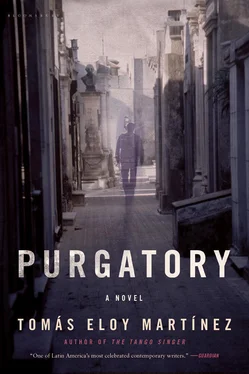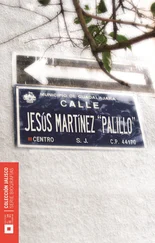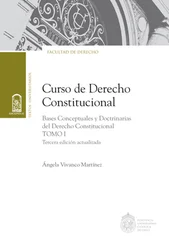The king and queen moved from one group to another, gracefully acknowledging the bows and curtsies. The air in the hall was increasingly muggy. The ladies’ dresses were mercifully light, but the gentlemen, all wearing starched shirts and dinner jackets, were dripping with sweat. Even the king appeared to be exhausted. His brow glistened and he had to mop it. The queen gave him a slight, barely perceptible gesture. The king approached the Eel and said: ‘We are extremely grateful, Presidente . Argentina is a magnificent country.’ The Eel applauded and the crowd followed suit. The queen went to look for her cape but could not find it. She called one of her ladies-in-waiting and asked that it be brought to her. The lady-in-waiting went to the cloakroom but returned empty-handed. ‘How strange,’ said the queen, ‘I gave it to one of you.’ ‘I left it over here,’ said a lady-in-waiting. Everyone in the hall joined the search for the missing cape, as rumours and gossip whirled around the room. ‘Someone stole it.’ ‘I didn’t see her wearing a cape.’ ‘Pink, did you say?’ ‘Really? The cape she was wearing when she arrived was black.’ ‘Who knows where she put it.’ ‘If it isn’t found, it will be a terrible embarrassment for the country.’ ‘I’m sure that some subversive has stolen it.’ Within five minutes, the whole room was in uproar. The toilets were checked, the kitchen, the servants, wardrobes; people checked behind curtains and under tablecloths. No one dared to leave. One of the aides-de-camp asked if they might be allowed to check the ladies’ handbags; Dupuy dismissed him with a curt gesture. ‘This is an honest country,’ he said. ‘The people here are respectable people. There are no thieves among us.’ ‘Her Majesty’s pink cape.’ ‘The pink cape!’ The words echoed around the room. The waiters and the ladies-in-waiting ran about like headless chickens but nothing was found. In Argentina, so many things disappeared overnight, so many people inexplicably ceased to exist that it hardly seemed surprising the queen’s cape should suddenly become unreal — one more sinister trick in the sleight of hand that was commonplace in Argentina.
Eventually it grew late, too late. The queen covered herself with a shawl one of her ladies-in-waiting had been wearing and the guests had no choice but to leave with the king and queen. At 2 a.m., the only people left in the hall were some of the guards, an aide-de-camp and the doormen. They competed with each other, snooping around, interrogating the kitchen staff who were clearing away the platters of canapés. At some point in the early hours, the chief of police arrived with a federal judge who insisted on investigating what was clearly a robbery. This would have been the end of the matter if, shortly before 3 a.m., one of the doormen went up to the judge, clapping his hand to his forehead. ‘A pink cape, you said? I think I saw it. One of the ladies left early wearing a pink cape. Maybe it was her own, I don’t know.’ The man was distressed, pale, he was afraid of losing his job. He described the lady in question, looked at the photographs they showed him of the guests at the gala and finally identified Emilia. ‘That’s her!’ he exclaimed. ‘I’m sure that’s her.’ At 3.30 a.m. the chief of police phoned Dupuy. He apologised profusely for disturbing him at such a late hour and explained that he would be calling at the house on calle Arenales in ten minutes. ‘Is it something serious?’ asked the doctor. ‘I hope not. I’m sure it’s just a misunderstanding.’
When Dupuy answered the door to him, Emilia was in bed. The chief explained what had happened and the doctor began to worry. ‘My daughter left the reception before I did,’ he explained, ‘I haven’t seen her. She was certainly wearing a pink cape when we arrived. Maybe it looked like the one the queen was wearing. I never pay any attention to such things. But this matter needs to be cleared up. I’ll go and wake my daughter.’ He burst into Emilia’s room, turned on the lights. He would have shaken her, shouted at her, but he did not want the police to overhear. Emilia sat up in bed. Her father’s furious tone completely bewildered her. She wasn’t worried by his anger, she was sure she had done nothing wrong, and she thought it was a bit much for the chief of police to call at their house at 3.30 a.m. to clear up what was probably just a mix-up, a simple mistake. She saw the cape which D had designed for her draped across the chair next to her mother’s bed where she usually read. She saw the black dress lying on the floor. She hadn’t had the energy to hang them up when she got back from the party. She had been exhausted and wasn’t planning ever to wear them again. ‘Look, there’s my cape over there,’ she said to her father. ‘It’s mine.’ ‘Look at it carefully,’ Dupuy commanded. ‘It’s impossible the capes could be exactly the same, that would be too much of a coincidence.’ ‘Give me a minute, Papá , I’m in my nightdress. I’ll get up and look.’ ‘I have no intention of leaving this room,’ said her father. ‘The police are waiting. Get up right now. I’m not interested in your modesty.’ Emilia held the cape up to the light and saw nothing untoward. ‘It’s mine, I’m sure it is,’ she was about to say when she noticed in one of the folds a slender, almost invisible, red cord. The detail made her start, but she remained calm. If it was not her cape, then she would give it back and that would be that. She studied it more carefully. Under the collar was a tiny, exquisitely embroidered escutcheon, the royal Spanish coat of arms with a lion rampant and a three-towered castle in the upper quadrants flanked by the pillars of Hercules and bearing the motto Plus Ultra . The needlework was so delicate that, with a magnifying glass, it was possible to read the words. It was not her cape. She had made a mistake. The suffocating heat, her desperate need to get away. Now she remembered that her cape had not been where she had left it and, without a second thought, she had taken the first cape she had seen. She laughed at her gaffe. She would be happy to see the queen and offer her apologies. She would show her that the two capes were like two peas in a pod and the queen would immediately understand. She was sure the queen would say: ‘I could just as easily have made the same mistake. I’d like to know who your dressmaker is.’ And Emilia would tell her about D. But where was D’s cape? Somewhere in the hall, she supposed, with the lost property. She would explain the situation to her father and he would have it tracked down. She had spent her whole life watching him solve other people’s problems. She brushed back her hair, smoothed her nightdress. ‘ Papá ,’ she called. Dupuy was still in her room with his back to the bed, his hands on his hips. ‘It looks like they were right. The cape I picked up isn’t mine. There’s a simple explanation — the two capes are almost identical.’
‘You dare to say that, as though this were some trivial mistake?’ Nothing now could contain Dupuy’s fury. ‘The police already see this as an act of subversion. It would take very little to trigger a diplomatic incident. Give me your cape too. If they are identical, then we can get out of this mess by showing them both.’
Emilia stammered an apology. ‘I can’t find mine. I don’t know where I left it. I think I must have picked up the wrong cape as I was leaving.’
‘Give me the one you’ve got right now,’ said Dupuy, snatching it from her. ‘I have people waiting who have been up all night because of your blunder. And don’t even think about going back to bed. We need to have a serious talk, I will not have a thief as a daughter.’ He summoned up the self-righteous smile he always used in difficult situations and went out to deal with the police. As he went, he concocted the version of the incident which would be published by the papers. Emilia did not deserve his protection; it was his good name that he needed to save.
Читать дальше












